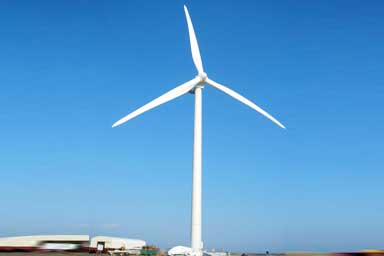Mitsubishi contends that it lost nearly $1 billion because of a dispute with B&B, according to an opinion by Judge Travis Laster of the Chancery Court in Delaware. Mitsubishi subsidiary Mitsubishi Power Systems Americas (MPSA) sued B&B in April 2009 for breach of contract and succeeded in issuing an injunction on money transfers. B&B, which went into administration last year, was accused of shifting money out of the US to avoid making payments on two contracts for a total of 456 Mitsubishi 2.4MW wind turbines.
But, countering the Mitsubishi claim, B&B accuses MPSA of concealing its intellectual property battle with GE over its Mitsubishi Heavy Industries (MHI) flagship 2.4MW turbine. The judge ruled that there could be some truth in B&B's claim and is allowing B&B to pursue the counter accusation of fraud.
The patent battle between GE and Mitsubishi so far centres on five of GE's US patents. At stake are tens of millions of dollars in GE licensing fees and vital US market share while government stimulus funds are available. GE is set to launch its rival 2.5MW turbine in the US later this year. So far, MHI has been found not to violate three of the five patents, a ruling by the US International Trade Commission (ITC) that GE is appealing. The Delaware case, against B&B, was temporarily stayed in February for four months after a request by MPSA and because of the ITC decision. Meanwhile, another patent-infringement suit, filed by GE against Mitsubishi and citing the same three patents, is on hold pending the outcome of the ITC case. The other, in which GE cited two further wind-technology patents, was initiated in February. Mitsubishi again denies the charges.
In the case against B&B, MPSA was accused of being aware of serious performance problems with the 2.4MW MHI turbine. Of the 118 MHI turbines already installed in B&B's Gulf Wind project, B&B said: "Not a single turbine was able to achieve trouble-free commercial operation" as of April 2009.
Judge Laster ruled largely in favour of MPSA, but he is allowing B&B to proceed with its accusation of fraud because, he wrote, the evidence suggests that MPSA may not have properly disclosed intellectual property issues and instead offered a "misleading combination of half-truths and omissions". MPSA is disputing the allegation.
Judge Laster cites an email from 2007 that, he states, together with turbine specifications "suggests that MPSA made an intentionally vague and misleading partial disclosure about the power range for the MWT95 turbine (one of its 2.4MW models) to conceal the intellectual property issues MPSA faced".
In evidence, an MPSA representative said in an email forwarded to a B&B technician: "(We) will ask GE for licensing no matter what ...
even though it is before the negotiations, it is impossible for us to continue our business in the US without GE's licensing, so we have to prepare ourselves for the worst. That is the essence."
The MPSA official also writes that his company intentionally uses some "ambiguous" technical expressions as a "dodge" to "avoid the patent infringement", but does not disclose the patent involved. MHI's first 2.4 MW turbine was erected at Iberdrola's Klondike III project in 2007-2008. MHI's turbine could have been re-engineered since the discussions and emails.
In the judge's opinion, it emerges that as early as January 2007, GE had sent a letter of warning to one of MHI's turbine customers citing potential intellectual property problems. MPSA and GE representatives then met in March 2007 "to discuss a licensing agreement and negotiations continued throughout the month". The court document adds that in June 2007 "MHI sent GE a letter reiterating its desire to enter into a licensing arrangement that would resolve GE's claims".
Out of court
It is the first indication that the companies have ever discussed licensing GE's wind technology outside court. "We discussed multiple patents including those in the litigation", confirmed GE. Mitsubishi sources, however, disputed that Mitsubishi ever felt it necessary to obtain a license from GE. They said that during the meetings, Mitsubishi representatives remained sure that their technology has never infringed GE's patents.
GE did not file its first patent suit against MHI, at the ITC, until February 2008. GE has said it has 148 US patents related to wind energy, whereas MHI has substantially fewer. "We believe that there are multiple areas where MHI's 2.4MW wind turbines infringe on GE's existing patents," GE has said. Arguing for a stay in the Delaware case, MPSA said that the ITC decision - that it was not infringing GE's three patents - destroyed B&B's accusation of fraud because of intellectual property issues.
The three suits filed cite GE patents for variable-speed technology, low-voltage ride-through technology, zero-voltage ride-through technology, and a bed-frame for supporting the rotor, gearbox and drive shaft.

.png)


.png)










